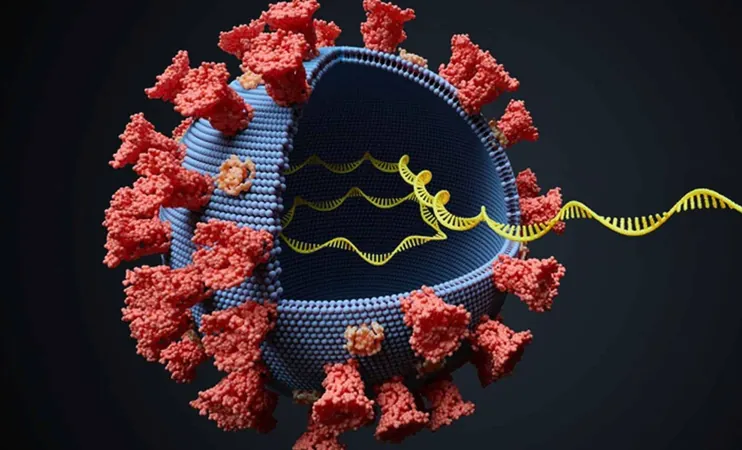
Revolutionary AI System Set to Predict and Halt Deadly Disease Outbreaks—Discover the Future of Health Surveillance!
2025-01-05
Author: Ken Lee
In an age where bacteria and viruses are rapidly evolving, challenging our healthcare frameworks, researchers at the University of Cambridge have unveiled an innovative method that could redefine how we identify and mitigate these emerging health threats.
Infectious diseases continue to impose a significant global burden, with pathogens like Bordetella pertussis (the bacteria behind whooping cough) and Mycobacterium tuberculosis (the cause of tuberculosis) evolving in ways that enable them to resist vaccines and treatments. Conventional surveillance methods, which depend heavily on expert panels and manual data analysis, are often sluggish and resource-intensive, hampering swift public health responses.
The Breakthrough in Real-Time Pathogen Surveillance
A dedicated team led by Dr. Noémie Lefrancq and Professor Julian Parkhill has developed an advanced automated system that leverages genetic sequencing to continuously track pathogen evolution. This cutting-edge technique allows researchers to create detailed "family trees" of pathogens, providing unprecedented insights into how quickly variants emerge and which possess alarming traits like antibiotic resistance or enhanced ability to spread.
As Professor Parkhill emphasizes, “Our method offers an entirely objective means of detecting new disease strains by scrutinizing their genetics and propagation among populations.”
Key Advantages of This Novel System:
- Speed: Automated detection significantly outpaces traditional manual analysis. - Scalability: The system is applicable across a diverse spectrum of pathogens, including both bacteria and viruses. - Accessibility: Only a minimal number of samples are required, making it a viable option even in resource-limited environments.
This advancement could hardly come at a better time, as the COVID-19 pandemic has starkly highlighted the critical need for swift variant identification.
Transformative Early Detection for Public Health
The research team has already applied their innovative method to Bordetella pertussis amid recent significant outbreaks, uncovering three previously unrecognized variants in circulation. This emphasizes the system's capacity to reveal hidden threats promptly.
Professor Sylvain Brisse of Institut Pasteur remarked on the timely application of this technology for whooping cough, especially given the emergence of antimicrobial-resistant strains. The technique was then utilized to study Mycobacterium tuberculosis, revealing two antibiotic-resistant variants that are currently spreading, presenting immediate ramifications for public health strategies. According to Professor Henrik Salje, "By identifying a rapidly proliferating antibiotic-resistant variant, we can adjust treatment protocols accordingly to curb its spread."
Entering a New Era for Global Health Surveillance
The potential impact of this research extends well beyond individual pathogens. Real-time pathogen monitoring could reshape global health surveillance, especially in low-resource settings where infectious diseases tend to thrive and exact the highest toll.
The COVID-19 pandemic illustrated how quickly variants, such as the formidable Omicron, can emerge and proliferate. Dr. Lefrancq noted, "This groundbreaking method can swiftly detect whether new transmissible variants are circulating, applicable to an extensive variety of bacteria and viruses."
Significant Benefits for Global Health Initiatives:
- Proactive Responses: Governments can enhance vaccine development and treatment strategies based on real-time insights. - Equitable Access: Due to its user-friendly nature, this method is attainable for regions with underdeveloped healthcare infrastructures. - Comprehensive Monitoring: Integration into existing surveillance can help fill critical coverage gaps.
Confronting the Global Threat of Pathogen Evolution
The ceaseless evolution of pathogens still poses a grave challenge to public health systems. Genetic mutations enable many bacteria and viruses to circumvent vaccines and resist treatments, often resulting in sudden outbreaks that leave healthcare systems in crisis.
Professor Salje highlighted the potential upward shift this research could inspire in government responses to infectious diseases: “This method could fundamentally change how nations combat illness.” By adopting this approach within global health strategies, countries may preemptively manage threats before they escalate into widespread problems.
The research team plans to further refine their technique and explore its potential across a wider array of pathogens. As Professor Salje stated, “This initiative is a key component in mounting any effective public health response to infectious diseases.”
Stay tuned—this groundbreaking advancement in disease surveillance might just be the key to tackling the next pandemic before it starts!

 Brasil (PT)
Brasil (PT)
 Canada (EN)
Canada (EN)
 Chile (ES)
Chile (ES)
 Česko (CS)
Česko (CS)
 대한민국 (KO)
대한민국 (KO)
 España (ES)
España (ES)
 France (FR)
France (FR)
 Hong Kong (EN)
Hong Kong (EN)
 Italia (IT)
Italia (IT)
 日本 (JA)
日本 (JA)
 Magyarország (HU)
Magyarország (HU)
 Norge (NO)
Norge (NO)
 Polska (PL)
Polska (PL)
 Schweiz (DE)
Schweiz (DE)
 Singapore (EN)
Singapore (EN)
 Sverige (SV)
Sverige (SV)
 Suomi (FI)
Suomi (FI)
 Türkiye (TR)
Türkiye (TR)
 الإمارات العربية المتحدة (AR)
الإمارات العربية المتحدة (AR)